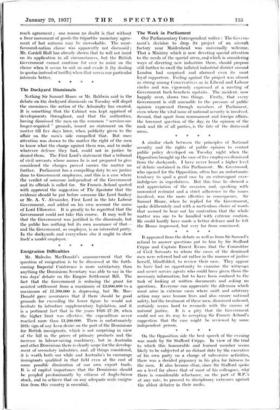' Nothing Sir Samuel Hoare or Mr. Baldwin said in
the debate on the dockyard dismissals on Tuesday will dispel the uneasiness the action of the Admiralty has created. It is something that the Cabinet was kept apprised of developments throughout, and that the authorities, having dismissed the men on the common " services-no- longer-required " grounds, issued no statement on the matter till five days' later, when publicity given to the Affair on the men's side compelled that. But once attention was drawn to the matter the right of the men to know what the charge against them was, and to make whatever defence they had, could not in justice be denied them. The First Lord's statement that a tribunal of civil servants whose names he is not prepared to give considered the charges proved carries the matter no further. Parliament has a compelling duty to see justice done to Government employees, and this is a case where the verdict of someone independent of the Government and its officials is called for. Sir Francis Acland quoted with approval the suggestion of The Spectator that the evidence should be put before someone like Lord Sankey or Mr. A. V. Alexander, First Lord in the late Labour Government, and added on his own account the name of Lord Ullswater. It is greatly to be regretted that the Government could not take this course. It may well be that the Government was justified in the dismissals, but the public has nothing but its own assurance of that— and the Government, as employer, is an interested party. In the doCkyards and everywhere else it ought to show itself a Model. employer.
* * *






















































 Previous page
Previous page